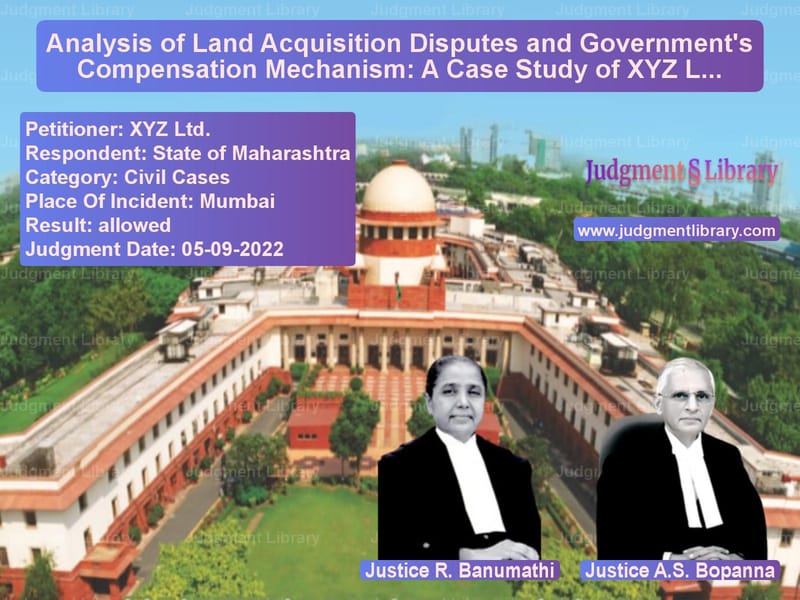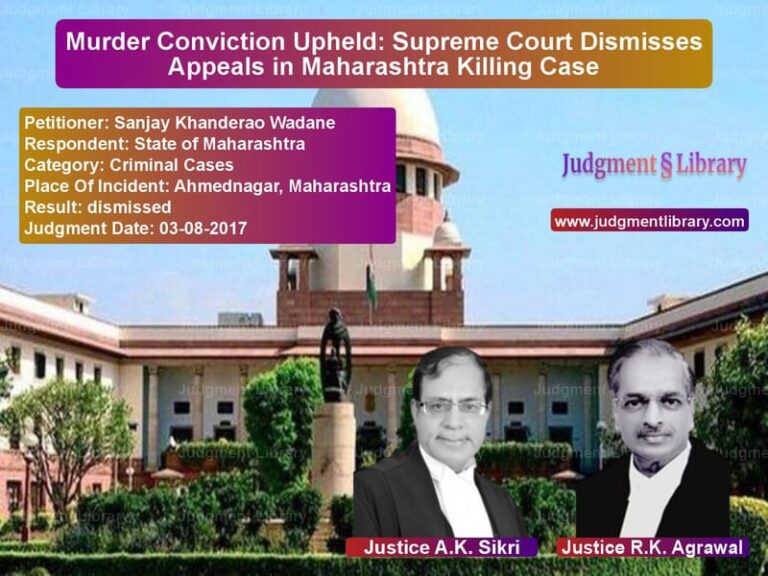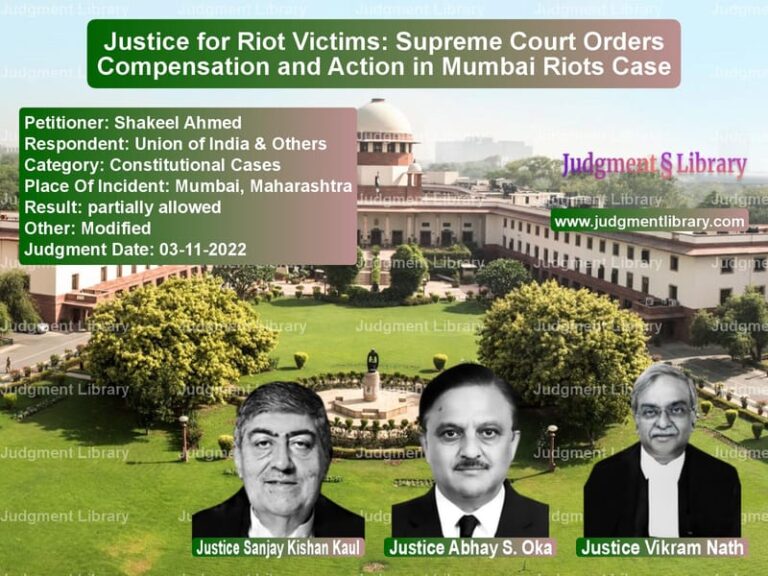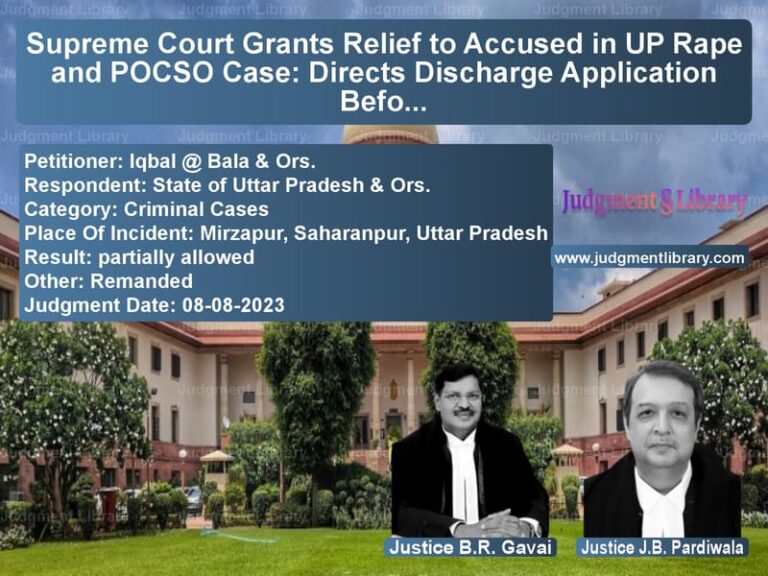Analysis of Land Acquisition Disputes and Government’s Compensation Mechanism: A Case Study of XYZ Ltd. v. State of Maharashtra
The case of XYZ Ltd. v. State of Maharashtra revolves around a dispute concerning land acquisition and the compensation mechanism provided under the Land Acquisition Act. The appellant, XYZ Ltd., sought an enhancement of the compensation amount initially offered by the government for their acquired land. The land acquisition was conducted for a public purpose under the provisions of the Land Acquisition Act, 1894. However, the appellant argued that the compensation offered was insufficient considering the market value of the land at the time of acquisition. The appellant further contended that the process of determining compensation was flawed and that it should be enhanced to reflect the true value of the land. The case delves into the legal issues surrounding the calculation of compensation, the interpretation of relevant sections of the Land Acquisition Act, and the government’s responsibility to ensure fair compensation for acquired land.
Background of the Case
The appellant, XYZ Ltd., owned a piece of agricultural land in Maharashtra, which was acquired by the government for the construction of a public infrastructure project. The government issued a notification under Section 4 of the Land Acquisition Act, 1894, and proceeded with the acquisition of the land. The compensation offered to the appellant was based on the government’s determination of the market value of the land. However, the appellant argued that the market value used by the government was outdated and did not reflect the actual value of the land. As a result, the appellant filed a writ petition seeking a review of the compensation amount and the process used to determine it. The case was initially heard by the High Court of Maharashtra, which dismissed the appellant’s plea. The appellant then filed an appeal in the Supreme Court.
Petitioner’s Arguments
The appellant, XYZ Ltd., presented several arguments to support its case:
- Insufficient Compensation: The appellant argued that the compensation amount offered by the government was too low and did not reflect the true market value of the land. They contended that the government had based the compensation on outdated valuations, which did not account for the appreciation in the land’s value over time.
- Incorrect Methodology for Valuation: The appellant argued that the methodology used by the government to assess the value of the land was flawed. They claimed that the government had failed to consider the highest and best use of the land in determining its value. The appellant emphasized that the land had significant potential for development, which was not factored into the compensation calculation.
- Violation of Fair Compensation Principles: The appellant argued that the government’s offer violated the principles of fairness and equity in land acquisition. They cited previous judgments, including the landmark case of “K.K. Verma v. Union of India,” to argue that compensation should reflect not only the market value of the land but also the social and economic impact of the acquisition on the landowners.
- Failure to Adequately Assess Land’s Market Value: The appellant pointed out that the government had failed to adequately assess the market value of the land. They argued that the government had not consulted independent valuers or taken into account the rising demand for land in the area, which led to an undervaluation of the land.
Respondent’s Arguments
The respondent, the State of Maharashtra, presented the following counterarguments:
- Legality of the Compensation Process: The respondent argued that the process followed to determine the compensation was in accordance with the provisions of the Land Acquisition Act, 1894. They emphasized that the compensation had been calculated based on the guidelines provided under the Act, and the procedure was fair and transparent.
- Market Value Determination: The respondent contended that the market value of the land had been determined based on the available data, which included a fair assessment of the land’s value at the time of acquisition. The respondent emphasized that the appellant’s claim for a higher valuation was based on speculative estimates and not on the actual market conditions.
- Proper Use of Government’s Valuation Methodology: The respondent argued that the government’s valuation methodology was in line with the provisions of the Land Acquisition Act and the applicable rules. They pointed out that the compensation offered to the appellant had been determined after taking into account various factors, including the nature of the land and its current usage.
- Fair Compensation Determined by the Government: The respondent emphasized that the compensation amount offered to the appellant was reasonable, and there was no legal requirement to enhance it further. The respondent argued that the appellant was seeking compensation far beyond what was justified based on the land’s market value.
The Court’s Reasoning
The Supreme Court, after considering the arguments from both parties, made the following observations:
- Importance of Fair Compensation: The Court acknowledged the importance of providing fair and adequate compensation in land acquisition cases. The Court reiterated that the purpose of land acquisition is to balance the public interest with the rights of the landowners, and fair compensation is a key element of this balance.
- Market Value Determination: The Court emphasized that the market value of the land should be determined based on the highest and best use of the land, and not just its current usage. The Court found that the government’s valuation did not adequately consider the potential for the land’s development, which resulted in an undervaluation.
- Legal Precedents on Land Acquisition Compensation: The Court referred to several precedents, including the “K.K. Verma v. Union of India” case, which established that compensation should not only reflect the market value of the land but also consider factors such as the land’s potential for development, the social impact on the landowner, and the economic consequences of the acquisition.
- Failure of the Government’s Valuation Process: The Court found that the government had failed to properly assess the market value of the land. The Court observed that the compensation amount should have taken into account the potential appreciation in the value of the land and the specific circumstances surrounding the acquisition.
- Order for Enhanced Compensation: The Court concluded that the compensation amount offered to the appellant was inadequate and ordered that the compensation be enhanced to reflect the true market value of the land. The Court also directed the government to consider the land’s potential for development when determining the final compensation amount.
- Restitution of Possession: The Court did not order restitution of possession but emphasized that the appellant should be compensated fairly for the loss of land and the impact of the acquisition on their livelihood. The Court noted that the appellant had not objected to the acquisition itself, but only to the amount of compensation offered.
The Court’s Decision
The Supreme Court made the following orders:
- Enhancement of Compensation: The Court directed the State of Maharashtra to enhance the compensation amount to reflect the true market value of the land, taking into account the potential for development and the social impact on the appellant.
- Review of Valuation Methodology: The Court directed the government to review its valuation methodology and ensure that the compensation offered in future acquisitions is fair and reflective of the land’s highest and best use.
- Payment of Enhanced Compensation: The Court ordered that the enhanced compensation be paid to the appellant within six months of the judgment, along with interest at the rate of 9% per annum from the date of the original compensation offer until the date of payment.
- No Order on Restitution of Possession: The Court did not grant the appellant’s request for restitution of possession but emphasized the importance of fair compensation in such cases.
Conclusion
This case highlights the complex issues surrounding land acquisition and compensation. The Supreme Court’s decision reinforces the importance of providing fair compensation to landowners whose land is acquired for public purposes. The judgment also emphasizes that the government must assess the market value of the land accurately and consider the land’s potential for development when determining compensation. This case serves as a reminder of the need for transparency and fairness in land acquisition processes, particularly when determining compensation in cases involving significant public infrastructure projects.
Read also: https://judgmentlibrary.com/benami-ownership-and-proving-of-title-pushpalata-vs-vijay-kumar/
Petitioner Name: XYZ Ltd..Respondent Name: State of Maharashtra.Judgment By: Justice R. Banumathi, Justice A.S. Bopanna.Place Of Incident: Mumbai.Judgment Date: 05-09-2022.
Don’t miss out on the full details! Download the complete judgment in PDF format below and gain valuable insights instantly!
Download Judgment: xyz-ltd.-vs-state-of-maharashtra-supreme-court-of-india-judgment-dated-05-09-2022.pdf
Directly Download Judgment: Directly download this Judgment
See all petitions in Contract Disputes
See all petitions in Property Disputes
See all petitions in Damages and Compensation
See all petitions in Specific Performance
See all petitions in Judgment by R. Banumathi
See all petitions in Judgment by A. S. Bopanna
See all petitions in allowed
See all petitions in supreme court of India judgments September 2022
See all petitions in 2022 judgments
See all posts in Civil Cases Category
See all allowed petitions in Civil Cases Category
See all Dismissed petitions in Civil Cases Category
See all partially allowed petitions in Civil Cases Category







